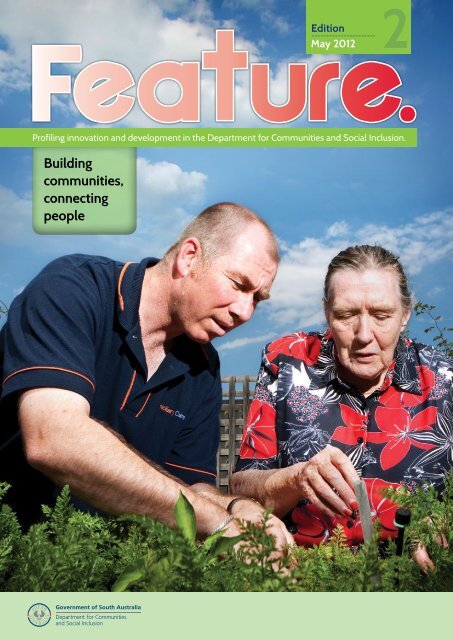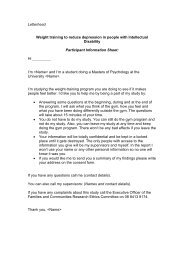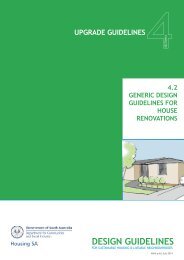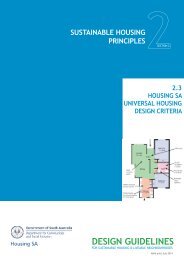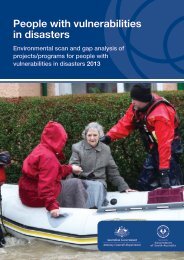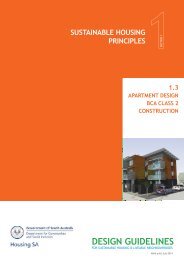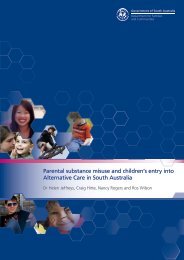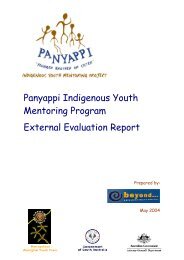Building communities, connecting people - DCSI - SA.Gov.au
Building communities, connecting people - DCSI - SA.Gov.au
Building communities, connecting people - DCSI - SA.Gov.au
You also want an ePaper? Increase the reach of your titles
YUMPU automatically turns print PDFs into web optimized ePapers that Google loves.
Feature.<br />
2<br />
Edition<br />
May 2012<br />
Profiling innovation and development in the Department for Communities and Social Inclusion.<br />
<strong>Building</strong><br />
<strong>communities</strong>,<br />
<strong>connecting</strong><br />
<strong>people</strong>
Contents<br />
Editorial<br />
Editorial 2<br />
Domiciliary Care’s<br />
Dementia Day Program 4<br />
<strong>Building</strong> friendships<br />
one block at a time 5<br />
<strong>Building</strong> <strong>communities</strong><br />
at the local level - The<br />
Community <strong>Building</strong><br />
Team, Housing <strong>SA</strong> 6<br />
Linking neighbourhoods<br />
for <strong>people</strong> with disability 8<br />
A new approach to<br />
regional collaboration<br />
in Adelaide’s north 9<br />
Post-school Options and<br />
Beyond Expo 10<br />
<strong>Building</strong> <strong>communities</strong><br />
through employment 11<br />
<strong>Building</strong> pathways for<br />
blokes on the block 11<br />
Employment in remote<br />
Aboriginal <strong>communities</strong> 13<br />
Helping <strong>communities</strong><br />
rebuild after a disaster 15<br />
Feature is produced by the Department<br />
for Communities and Social Inclusion.<br />
Electronic copies are available at:<br />
www.dcsi.sa.gov.<strong>au</strong>/research/<br />
To provide feedback or comments,<br />
please contact 8413 8171 or email:<br />
dcsiresearchcommunications@dcsi.sa.gov.<strong>au</strong><br />
Job Number: <strong>DCSI</strong>-155<br />
ISSN 1839-2024<br />
Communities matter to <strong>people</strong>. Where we<br />
live influences our access to opportunities,<br />
our daily lived experience, and our health,<br />
safety and wellbeing. And, despite changes<br />
in how and with whom we relate, local<br />
<strong>communities</strong> are still an important place for<br />
relationship and connection; identity and<br />
care; and for access to services and resources.<br />
On 21 October 2011, Premier<br />
Jay Weatherill announced<br />
changes to government<br />
departments, including<br />
the establishment of the<br />
Department for Communities<br />
and Social Inclusion (<strong>DCSI</strong>).<br />
<strong>DCSI</strong> has been created to<br />
support and enable the South<br />
Australian <strong>Gov</strong>ernment’s<br />
commitment to engage with<br />
and build <strong>communities</strong>. The<br />
Department brings together<br />
a range of services, funding,<br />
planning, and policy functions<br />
designed to support vulnerable<br />
<strong>people</strong> in the community and<br />
build community capacity<br />
and engagement. These<br />
include social housing and<br />
homelessness; disability and<br />
ageing services; as well as<br />
Social Inclusion; Multicultural<br />
Affairs, the Offices for<br />
Youth, Women; Volunteers;<br />
the Southern Suburbs; and<br />
Northern Connections.<br />
Together, we have a unique<br />
opportunity to work with<br />
and for <strong>communities</strong> across<br />
South Australia.<br />
2 Feature Magazine May 2012 <strong>Building</strong> <strong>communities</strong>, <strong>connecting</strong> <strong>people</strong>
The concept of community<br />
and the role it plays in <strong>people</strong>’s<br />
lives has changed enormously<br />
over recent years. People in<br />
the 21st century are mobile<br />
and their <strong>communities</strong> diverse<br />
and scattered, built around<br />
multiple roles and interfaces<br />
and accessed through<br />
different mediums. However,<br />
whilst this may suggest that<br />
local <strong>communities</strong> are less<br />
important, in fact we see the<br />
opposite. There is a resurgence<br />
of interest in community, an<br />
appreciation of its impacts and<br />
a valuing of what it has<br />
to offer. We also understand<br />
that where a person lives<br />
affects their opportunities<br />
and contributes substantially<br />
to wellbeing.<br />
Further, the features and<br />
qualities of the <strong>communities</strong><br />
we want into the future are<br />
matters of active debate.<br />
South Australia’s Strategic<br />
Plan includes a vision of<br />
<strong>communities</strong> which are<br />
vibrant places to live, work,<br />
play and visit. Thinker in<br />
Residence Dr Alexandre<br />
Kalache has challenged us<br />
to consider <strong>communities</strong><br />
through an age-friendly lens,<br />
and commit to planning<br />
and building <strong>communities</strong><br />
which are inclusive of all.<br />
The Integrated Design<br />
Commission, established to<br />
support sustainable and livable<br />
<strong>communities</strong>, is currently<br />
leading discussion on what<br />
makes a city livable, and our<br />
aspirations for Adelaide into<br />
the 21st century.<br />
We are also aware that<br />
loneliness is a daily and difficult<br />
struggle for many <strong>people</strong>.<br />
Loneliness, disconnection<br />
and social isolation are one<br />
of the greatest challenges<br />
our society faces. Helping<br />
<strong>people</strong> connect with others<br />
– building relationships, care<br />
and simple neighbourliness –<br />
is central to the concerns in<br />
building <strong>communities</strong> in the<br />
21st century.<br />
Feature has been designed<br />
to profile innovation and<br />
development across our<br />
portfolio. For this edition<br />
we have chosen a theme<br />
of <strong>Building</strong> Communities,<br />
Connecting People. The<br />
work that is profiled here<br />
includes initiatives to build<br />
connections for <strong>people</strong> who<br />
are isolated, especially children<br />
and adults with disability. We<br />
also discuss some outstanding<br />
work targeting long-term<br />
joblessness in disadvantaged<br />
<strong>communities</strong>. High-level and<br />
complex regional planning<br />
is exemplified in work led by<br />
Northern Connections; at the<br />
other end of the spectrum,<br />
a new partnership has been<br />
borne out of community<br />
concerns for their young<br />
<strong>people</strong> living with disability.<br />
On-the-ground community<br />
development approaches<br />
are also demonstrated as<br />
effective responses to highly<br />
stressed neighbourhoods,<br />
as well as to <strong>communities</strong><br />
affected by disaster.<br />
A strong theme in all these<br />
articles is the importance of<br />
partnership. We can only<br />
build <strong>communities</strong> by working<br />
together. This is an aspect<br />
of our work that <strong>DCSI</strong> will<br />
continue to strengthen into<br />
the future.<br />
As a companion piece to this<br />
edition, we are also releasing<br />
the first of our new ‘think<br />
pieces’ on working with and<br />
for <strong>communities</strong>. <strong>Building</strong><br />
Communities aims to stimulate<br />
thinking and debate around<br />
community building and<br />
community issues, including<br />
about the role of <strong>DCSI</strong> in this<br />
process. Please read this in<br />
conjunction with Feature –<br />
we hope both contribute to<br />
lively debate and support a<br />
growing knowledge base on<br />
community building.<br />
<strong>DCSI</strong> is committed to working<br />
with and for <strong>communities</strong>,<br />
always in partnership with<br />
others, to support vibrant,<br />
viable, diverse, inclusive and<br />
connected <strong>communities</strong> of<br />
opportunity for the <strong>people</strong><br />
of South Australia. It is also<br />
our vision that the benefits<br />
within <strong>communities</strong> should<br />
be accessible to all, and<br />
sustainable into the future.<br />
Joslene Mazel<br />
Chief Executive<br />
Department for Communities<br />
and Social Inclusion<br />
Feature Magazine May 2012<br />
3
Domiciliary Care’s Dementia Day Program<br />
Helping <strong>people</strong> with dementia stay connected<br />
Dementia currently affects<br />
approximately 269,000 <strong>people</strong><br />
across Australia, including<br />
approximately 21,800 <strong>people</strong><br />
in South Australia. After a<br />
dementia diagnosis, concern is<br />
often focused on the person’s<br />
symptoms, behaviour and<br />
care needs, rather than on the<br />
person as an individual. In fact,<br />
the growing social isolation of<br />
<strong>people</strong> with dementia, as well as<br />
their carers, is one of the most<br />
invidious aspects of the illness.<br />
Losing the ability to communicate<br />
can be one of the most<br />
frustrating and difficult problems<br />
for someone with dementia.<br />
People find it increasingly<br />
difficult to express themselves<br />
and understand what others say.<br />
They can become isolated and<br />
disconnected, losing friendships<br />
and relationships, as well as<br />
their ability to participate in the<br />
community. Catching public<br />
transport, dealing with others and<br />
simple daily tasks become more<br />
difficult and <strong>people</strong> gradually lose<br />
interest and confidence in getting<br />
out and about.<br />
People’s social and<br />
communication needs are the<br />
major focus of Domiciliary Care’s<br />
Dementia Day Program, which<br />
operates five days a week at<br />
four sites across metropolitan<br />
Adelaide. The Program provides<br />
<strong>people</strong> with the opportunity<br />
to socialise with others, make<br />
connections and take part in<br />
activities to stimulate their minds<br />
and bodies according to individual<br />
abilities and interests. A wide<br />
range of activities and outings are<br />
available, including low impact<br />
exercise, ball games, crafts,<br />
puzzles, music and gardening.<br />
Those who can manage a<br />
similar level of activity attend<br />
together. Transport to and from<br />
the program is a key element<br />
in supporting access, as is the<br />
support that staff can provide<br />
to help meet the physical and<br />
behavioural care needs which<br />
often preclude involvement in<br />
mainstream community activities.<br />
For many <strong>people</strong>, the Program<br />
is the only opportunity they<br />
get to engage with the world<br />
outside their homes, or for their<br />
carers to take a break from<br />
the constant vigil of caring for<br />
loved ones. Carers frequently<br />
notice lasting benefits, including<br />
calmer behaviour and less<br />
anxiety. The skill maintenance<br />
and socialisation provided in the<br />
program, along with the respite<br />
the carer gains, are often key to<br />
a person being able to continue<br />
to remain at home.<br />
For more information<br />
contact Jim Gillespie,<br />
Supervisor, Domiciliary Care,<br />
phone (08) 8440 6731 or<br />
jim.gillespie@dcsi.sa.gov.<strong>au</strong><br />
National Facts and Figures<br />
> > An estimated 269,000<br />
Australians currently live<br />
with dementia<br />
> > Without a significant medical<br />
breakthrough, this number<br />
is expected to soar to about<br />
981,000 by 2050, with<br />
50,740 in South Australia<br />
> > Each week there are 1500<br />
new cases of dementia<br />
diagnosed in Australia.<br />
> > Dementia is the third leading<br />
c<strong>au</strong>se of death in Australia,<br />
after heart disease and stroke<br />
> > One in four <strong>people</strong> over the<br />
age of 85 have dementia<br />
> > Dementia is the single<br />
greatest c<strong>au</strong>se of disability<br />
in older Australians (aged<br />
65 years or older).<br />
4 Feature Magazine May 2012 <strong>Building</strong> <strong>communities</strong>, <strong>connecting</strong> <strong>people</strong>
<strong>Building</strong><br />
friendships<br />
one block<br />
at a time<br />
Once a week, in a small building<br />
in Victor Harbor, a group of<br />
young <strong>people</strong> are working<br />
together to build friendships<br />
and social skills in a unique way.<br />
These are the founding members<br />
of the Victor Harbor Disability<br />
Services ‘Lego Club’. Here, the<br />
once solitary play of constructing<br />
models and buildings from Lego<br />
has become a group adventure<br />
of learning.<br />
Lego Club began last August<br />
with the aim of providing a social<br />
learning space for children with<br />
an Autism Spectrum Disorder<br />
(ASD). Group members range<br />
in age from 6 – 12 years, and<br />
include some siblings of children<br />
with an ASD who act as peer<br />
mentors. Lego Club members are<br />
supported by trained facilitators<br />
who model social behaviours,<br />
assist group members to problem<br />
solve and resolve conflicts, and<br />
provide support for emotional<br />
regulation. Video modelling is<br />
also used to assist the many visual<br />
learners in the group sustain their<br />
social learning.<br />
Families involved in Lego Club<br />
have already been impressed with<br />
the level of enthusiasm shown<br />
by the young members, “We<br />
haven’t been able to stop him<br />
from counting down the days<br />
until the next group”, says one<br />
parent. Members of the group<br />
have also shared their enjoyment<br />
of having a place to belong.<br />
“Lego Club is the first club I have<br />
been in”, commented Jeffrey, a<br />
peer mentor in the club. There<br />
are also encouraging signs of<br />
friendships being continued<br />
outside of the group. “I know<br />
some of these kids from my<br />
school, but I didn’t play with<br />
them before”, explains Lachlan.<br />
Lego Club is based on the<br />
principles of ‘Lego therapy’,<br />
devised by Canadian psychologist<br />
Daniel LeGoff in the early 1990’s.<br />
LeGoff ran a psychology clinic<br />
that specialised in running social<br />
skills groups for children on the<br />
<strong>au</strong>tism spectrum. He noticed that<br />
the interactions between children<br />
in the waiting room, which had<br />
a large box of Lego, were often<br />
far better than those he was<br />
achieving in structured programs.<br />
He wondered what it was about<br />
the Lego that encouraged social<br />
interaction for children with ASD.<br />
The Victor Harbor Lego Club has<br />
adopted the key principles of<br />
Lego therapy and have added<br />
some local flavour to their<br />
activities, including an exhibit<br />
in the local Port Elliot Show in<br />
October 2011.<br />
For more information<br />
please contact the Victor<br />
Harbor Disability Services<br />
Team, on (08) 8552 0600 or<br />
erin.anear@dcsi.sa.gov.<strong>au</strong><br />
Feature Magazine May 2012<br />
5
<strong>Building</strong> <strong>communities</strong> at the local level -<br />
The Community <strong>Building</strong> Team, Housing <strong>SA</strong><br />
A grass-roots community building<br />
approach in Housing <strong>SA</strong> is<br />
achieving outstanding results.<br />
The Community <strong>Building</strong> Team<br />
has developed a unique approach<br />
to addressing community issues.<br />
The team receives referrals from<br />
local Housing <strong>SA</strong> offices, usually<br />
about streets or areas where<br />
there are problems, such as<br />
the dumping of rubbish, poor<br />
property conditions, or conflict<br />
between residents.<br />
The first step for Team Manager<br />
Sean Malone is doing background<br />
research. What are the issues<br />
in the area, and is community<br />
development the right approach<br />
Also important is developing<br />
a local profile - who are the<br />
local residents, what is the<br />
mix of housing stock and who<br />
are the key stakeholders This<br />
information guides strategies<br />
and approaches – for example, a<br />
block of flats where residents are<br />
predominantly young single men,<br />
will need different strategies than<br />
a street with older residents, or<br />
for a mixed community.<br />
The next step is the critical one of<br />
engagement. The first approach<br />
will often simply be knocking<br />
on doors, inviting <strong>people</strong> to a<br />
gathering to discuss local issues.<br />
These gatherings are usually<br />
based around food – for example,<br />
a BBQ or morning tea - whatever<br />
is likely to be work best in the<br />
target area. Getting <strong>people</strong><br />
together, engaged and talking<br />
may take one event, or several.<br />
The Team’s ‘issues pad’ (recording<br />
what <strong>people</strong> think are the issues<br />
in their local area) is an important<br />
strategy. Gradually the focus<br />
moves to solutions.<br />
The Team helps residents<br />
develop options and potential<br />
solutions, encouraging them<br />
to share responsibility for their<br />
neighbourhood (rather than<br />
seeing problems as something<br />
others need to fix).<br />
According to Sean, it is very<br />
important to be very clear<br />
about what can and can not be<br />
achieved, and to avoid building<br />
up unrealistic expectations.<br />
“For example, <strong>people</strong> won’t<br />
get major modifications to their<br />
homes through this process;<br />
we can’t ‘fix’ problems with the<br />
local shops. We have to be really<br />
clear about this – but it is part<br />
of being open, respectful and<br />
transparent.”<br />
Many issues the Team deals with<br />
are related to <strong>people</strong> feeling<br />
unsafe in their local area. People<br />
may have lived in the same house<br />
for eight years, but have never<br />
met the person next door. A key<br />
part of our work is helping <strong>people</strong><br />
gain confidence and develop<br />
relationships. Just helping <strong>people</strong><br />
6 Feature Magazine May 2012 <strong>Building</strong> <strong>communities</strong>, <strong>connecting</strong> <strong>people</strong>
meet their neighbours is really<br />
significant – that might be all<br />
it takes.”<br />
The Team supports residents to<br />
implement the solutions they<br />
have developed – for example,<br />
cleaning up the local area,<br />
planting gardens or improving<br />
security features.<br />
Key principles in the model the<br />
Team have developed include:<br />
> > Using a strengths-based<br />
approach to identify the assets<br />
and positive elements within<br />
a local community, as well as<br />
a systems analysis to assess<br />
how the local area impacts<br />
on residents.<br />
> > Openness and transparency<br />
with residents.<br />
> > Sharing responsibility with<br />
<strong>people</strong>, rather than solving<br />
problems for them.<br />
> > <strong>Building</strong> the skills, confidence<br />
and capacity of local residents.<br />
> > <strong>Building</strong> networks between<br />
residents as well as with<br />
community groups and<br />
key stakeholders such as<br />
local government, <strong>SA</strong> Police,<br />
churches, Neighbourhood<br />
Watch and non-government<br />
organisations. This is very<br />
important for project<br />
sustainability over the<br />
long term.<br />
At the start of each project,<br />
objectives, strategies and<br />
measurable outcomes are<br />
articulated, and these are<br />
assessed at the end with results<br />
and learning documented.<br />
The Team’s work is not restricted<br />
to public housing properties and<br />
tenants – they will work wherever<br />
Housing <strong>SA</strong> has a presence, and<br />
with all the residents of the area.<br />
For further information on<br />
the Community <strong>Building</strong> Team,<br />
please contact Sean Malone,<br />
sean.malone@dcsi.sa.gov.<strong>au</strong><br />
or phone (08) 8413 9064.<br />
Safer community living<br />
Following feedback from local<br />
residents, a community planning<br />
workshop was arranged in<br />
Semaphore Park. It focused on<br />
identifying safety and security<br />
hazards in and around the<br />
neighbourhood. An adapted<br />
version of the Crime Prevention<br />
Through Environmental Design<br />
principles was used to guide<br />
the process.<br />
Many of the issues identified<br />
required modifications, repairs and<br />
upgrades to the shared walkways<br />
and garden areas. Discussion<br />
among partners led to the idea<br />
of getting local job seekers and<br />
volunteers involved in horticulture<br />
training and work to upgrade local<br />
Housing <strong>SA</strong> properties in the area.<br />
The local ‘live training site’ aspect<br />
encouraged greater community<br />
ownership and pride, and at the<br />
same time helped improve the<br />
skills, confidence and employment<br />
prospects of job seekers.<br />
Project partners for this phase<br />
include Housing <strong>SA</strong>, <strong>SA</strong> Works<br />
(DFEEST), Heta Inc (training<br />
provider), City of Charles Sturt<br />
(Bower Cottages Community<br />
Centre) and the City of Port<br />
Adelaide Enfield. Forty training<br />
places were available and 49 local<br />
<strong>people</strong> registered to undertake<br />
the 16 week course, with several<br />
on a waiting list. Trainees who<br />
successfully complete the 16-<br />
week course will be awarded a<br />
nationally recognised Certificate II<br />
in Horticulture.<br />
Feature Magazine May 2012<br />
7
Stella Court transformed<br />
Stella Court at Hackham West has<br />
been transformed into a be<strong>au</strong>tiful<br />
flourishing garden through a<br />
community coming together.<br />
Through a series of engagement<br />
events, it was identified that<br />
closing off the thoroughfare<br />
through Stella Court would<br />
considerably reduce the problems<br />
experienced by residents, such as<br />
vandalism and general disruption.<br />
The closure of the thoroughfare<br />
led to a significant decrease in<br />
these problems, and also created<br />
a new space.<br />
Then a residents’ group was<br />
formed and with the support<br />
of Housing <strong>SA</strong> and City of<br />
Onkaparinga, they planned and<br />
created a garden in this space.<br />
Enthusiasm from residents<br />
has seen the continuing<br />
transformation of Stella Court<br />
into a safer community area<br />
that all can enjoy. Even <strong>people</strong><br />
who do not live in Stella Court<br />
have commented on the<br />
transformation.<br />
Positive outcomes of the<br />
collaborative process of developing<br />
the garden have included:<br />
> > new friendships being formed<br />
between tenants<br />
> > widening of social networks and<br />
> > confidence, ownership and<br />
pride in the area.<br />
Linking neighbourhoods for<br />
<strong>people</strong> with disability<br />
People with intellectual<br />
disability can struggle for<br />
meaningful engagement with<br />
the community, and some can<br />
experience profound isolation and<br />
loneliness. Often, <strong>people</strong> need<br />
individual support to connect<br />
with the community and develop<br />
relationships. These concerns led<br />
a local partnership - Disability<br />
Services, Hills Community Options<br />
Inc., and a parent - to develop the<br />
Neighbourhood Links program in<br />
the Mount Barker area.<br />
Neighbourhood Links assists<br />
<strong>people</strong> with an intellectual<br />
disability connect with services and<br />
activities in the local community as<br />
well as with each other, and helps<br />
them develop solutions to the<br />
problems of living independently.<br />
Based on the KeyRing model<br />
developed in England, it has been<br />
adapted to meet the needs of rural<br />
South Australia.<br />
At the heart of the model is a<br />
volunteer Links facilitator who<br />
lives within walking distance of<br />
ten <strong>people</strong> with an intellectual<br />
disability living independently.<br />
The facilitator develops<br />
relationships with network<br />
members, visiting them in their<br />
homes regularly, and helping<br />
them to develop relationships<br />
with each other. They help <strong>people</strong><br />
problem-solve and resolve issues,<br />
provide information about and<br />
support access to community<br />
services and activities, and facilitate<br />
monthly network meetings.<br />
Those involved in the network<br />
have increased confidence and<br />
ability to make decisions for<br />
themselves. They now have<br />
wider circles of networks, provide<br />
support and care to each other,<br />
and are actively engaged in the<br />
community. For example, the<br />
Mount Barker group organises and<br />
operates discos twice a year for<br />
other <strong>people</strong> with disability living<br />
in the area. Some have become<br />
involved themselves as volunteers.<br />
One person has developed a<br />
monthly newsletter which is<br />
posted in the local library and<br />
outlines events occurring in the<br />
area. Independent living capacity<br />
has increased, and in some cases<br />
the need for formal paid carer<br />
support has decreased.<br />
For more information<br />
contact Jill Marks, Greater<br />
Adelaide, Disability Services,<br />
Community and Home Support<br />
<strong>SA</strong>, phone (08) 7424 7888 or<br />
jill.marks@dcsi.sa.gov.<strong>au</strong><br />
8 Feature Magazine May 2012 <strong>Building</strong> <strong>communities</strong>, <strong>connecting</strong> <strong>people</strong>
A new approach to<br />
regional collaboration<br />
in Adelaide’s north<br />
Photo from left to right: Vinda Kong, Lea Stevens & Bev O’Brien<br />
Adelaide’s Northern Suburbs have been the focus<br />
of many partnership initiatives over the years, where<br />
<strong>people</strong> have come together with a shared concern<br />
to improve outcomes and opportunities for residents.<br />
The experience of these initiatives has highlighted<br />
the potential and value in collaboration, but also<br />
the challenges. Reviews have repeatedly indicated<br />
similar elements necessary for success: a clear focus<br />
and realistic, achievable goals; strong leadership;<br />
high level support; commitment and buy-in; the<br />
right stakeholders around the table with the right<br />
influence; and strategies to ensure sustainability<br />
over the long term.<br />
A unique coalition of stakeholders have now come<br />
together to forge a new approach to regional<br />
collaboration in Northern Adelaide. Supported<br />
by Northern Connections (<strong>DCSI</strong>) under the leadership<br />
of Director Lea Stevens, the coalition includes<br />
five Local <strong>Gov</strong>ernment Authorities (LGA’s) in the<br />
North, along with State and Commonwealth<br />
<strong>Gov</strong>ernments, business, universities and nongovernment<br />
organisations.<br />
Drivers for the Northern Adelaide<br />
collaboration include:<br />
> > the State <strong>Gov</strong>ernment’s 30 Year Plan for<br />
Greater Adelaide, which provides significant<br />
new opportunities for the region<br />
> > recognition that a regional approach on agreed<br />
priorities would provide a significant critical<br />
mass when arguing the case for funding and<br />
policy priorities<br />
> > the increasing government focus on regions,<br />
not individual LGAs, in issues relating to economic<br />
and community development and<br />
> > recent reports which point to opportunities to<br />
improve economic development, skills, workforce<br />
participation and employment opportunities<br />
and regional prosperity in the North and which<br />
recommend a governance structure that enshrines<br />
a regional approach to tackling these issues.<br />
The Collaboration has agreed to focus on<br />
three areas:<br />
(1) business and economic development;<br />
(2) education, skills and employment; and<br />
(3) planning and development.<br />
It has also agreed that social capability (in the<br />
broadest sense) and sustainable <strong>communities</strong> are<br />
an integral aspect of ‘success’ in each area.<br />
Although details are still being finalised, the<br />
structure of the collaboration is likely to include:<br />
> > an annual regional forum, which reviews<br />
progress against goals and targets<br />
> > a regional operations group, which meets three<br />
times per year, establishes task groups to achieve<br />
the agreed priorities, monitors progress and<br />
problem solves/elevates issues as required and<br />
> > task groups for each of the areas of focus,<br />
which have assigned tasks, meet as required,<br />
are chaired by an appropriate leader and include<br />
a wide range of stakeholders.<br />
Members are very aware of the history of<br />
previous collaborations in the area, and have<br />
agreed that if this partnership is to succeed:<br />
> > members must have equal status<br />
> > there must be clear targets and measurement<br />
of progress toward goals<br />
> > constructive leadership is required<br />
> > members must keep each other accountable and<br />
> > there must be demonstrated commitment from<br />
all involved.<br />
(continued on page 10)<br />
Feature Magazine May 2012<br />
9
Lea Stevens believes the collaboration<br />
is a unique opportunity for the North.<br />
“Five LGAs, which cover a large area<br />
and include a lot of <strong>people</strong>, in an<br />
area of South Australia that is going<br />
to grow substantially in the coming<br />
years, have voluntarily decided to<br />
work together bec<strong>au</strong>se they want<br />
better outcomes for the North. They<br />
recognise that, despite their diversity<br />
in size, population and profiles,<br />
they have many common interests<br />
which can be progressed through<br />
a partnership approach. Each will<br />
continue to work on their own<br />
issues in their own ‘patch’, but in<br />
the priority areas, they’ll work<br />
together on over-arching strategies.”<br />
The breadth of the collaboration,<br />
and its high level buy-in, is one<br />
of its distinctive and innovative<br />
features. Business and private<br />
industry will have a very important<br />
role, including representation on the<br />
regional operations group, as will<br />
education and training (including<br />
post-secondary options) and<br />
community groups.<br />
The sustainability of the partnership<br />
over the long-term is probably its<br />
greatest challenge. “These strategies<br />
have to be long term, and priorities<br />
won’t be achieved in one year, or<br />
even two. Strategies have to be<br />
broken down into small steps, which<br />
create an achievable plan of action.<br />
We are in it for the long h<strong>au</strong>l – five<br />
to ten years. It’s a long time for<br />
<strong>people</strong> and stakeholders to be<br />
committed and involved. A lot<br />
changes over that time, and will<br />
need to maintain commitment<br />
and momentum.”<br />
The collaboration’s operations group<br />
met for the first time at Parliament<br />
House on 2 March 2012.<br />
For further information,<br />
contact Dr Bev O’Brien, Deputy<br />
Director, Northern Connections,<br />
phone (08) 8252 0544 or<br />
bev.obrien@sa.gov.<strong>au</strong><br />
Post-school Options and<br />
Beyond Expo<br />
A community coming<br />
together to support young<br />
<strong>people</strong> with disability<br />
Planning to leave school and<br />
deciding what to do next is<br />
difficult for any young person -<br />
but it can be especially challenging<br />
if you have a disability and live<br />
in a rural area. Getting good<br />
information about pathways and<br />
post-school opportunities is a vital<br />
part of the process.<br />
Concern about the support<br />
available for young <strong>people</strong><br />
with disability transitioning from<br />
school was the impetus for a<br />
new community partnership in<br />
the Clare region. In consultation<br />
with schools, young <strong>people</strong><br />
and parents, the partnership<br />
developed and ran a successful<br />
Post School Options and Beyond<br />
Expo at the Clare Town Hall in<br />
November 2011.<br />
A Steering Committee brought<br />
together <strong>people</strong> and agencies<br />
from Clare and the surrounding<br />
districts of Balaklava, Burra,<br />
Eudunda, Riverton and<br />
Snowtown. Partners included<br />
Barossa Lower North Futures, the<br />
National Disability Coordination<br />
Officer Program, Uniting Care<br />
Wesley, the Department for<br />
Education and Child Development,<br />
Disability Services in <strong>DCSI</strong>, schools<br />
in the area and local government.<br />
Personal invitations were sent to<br />
potential participants in all public and<br />
independent schools across the region<br />
and to service agencies. Parents and<br />
carers were encouraged to attend as<br />
an important part in supporting<br />
young <strong>people</strong>.<br />
The term ‘disability’ was deliberately<br />
not used in invitations and promotional<br />
material, given the often negative<br />
associations it has for young <strong>people</strong>.<br />
Instead, the Expo was promoted as<br />
options beyond school for young<br />
<strong>people</strong> who may need extra assistance<br />
and guidance.<br />
In a true spirit of collaboration, school<br />
buses were made available to provide<br />
transport for <strong>people</strong> living in the<br />
Balaklava, Burra, Eudunda, Riverton,<br />
and Snowtown areas.<br />
The evening was attended by over<br />
100 young <strong>people</strong>, as well as parents,<br />
carers and teachers; and 45 stall<br />
holders provided information including<br />
TAFE <strong>SA</strong>, VET to Work Pathways,<br />
apprenticeships and traineeships,<br />
Supported Employment, Day Options,<br />
and employment services providers,<br />
including Disability Employment<br />
Services and Job Services Australia.<br />
The partnership will continue to work<br />
together to plan future events.<br />
For more information contact<br />
Rennie Strawbridge, Program<br />
Manager, Disability Services,<br />
Community and Home Support<br />
<strong>SA</strong>, phone (08) 8372 1418 or<br />
rennie.strawbridge@dcsi.sa.gov.<strong>au</strong><br />
10 Feature Magazine May 2012 <strong>Building</strong> <strong>communities</strong>, <strong>connecting</strong> <strong>people</strong>
<strong>Building</strong> <strong>communities</strong><br />
through employment<br />
High rates of entrenched joblessness are usually a<br />
feature of the most disadvantaged neighbourhoods<br />
and <strong>communities</strong>. Reducing unemployment – and thus<br />
poverty – is a key component of building strong, viable<br />
<strong>communities</strong>. However, this is not easy to achieve.<br />
Market forces alone are unlikely to be successful in<br />
getting many <strong>people</strong> into work: the reality of chronic<br />
unemployment is always complex, and to address it<br />
requires a person-to-person approach. A list of the<br />
issues that contribute to long-term joblessness and<br />
block success in employment is also a description of<br />
the most pressing and intractable social problems:<br />
extreme poverty, educational inequality, violence<br />
and family breakdown, substance abuse, mental<br />
health issues, disability and involvement with the<br />
criminal justice system.<br />
The personal and social costs of unemployment<br />
include severe financial hardship and poverty, debt,<br />
homelessness and housing stress, family tensions<br />
and breakdown, boredom, alienation, shame<br />
and stigma, social isolation, crime, erosion of<br />
confidence and self-esteem, the atrophying of<br />
work skills and ill-health. Most of these increase<br />
with the duration of unemployment.<br />
In partnership with others, <strong>DCSI</strong> is working with<br />
individuals and <strong>communities</strong> across South Australia<br />
to help <strong>people</strong> become job-ready and succeed in<br />
meaningful work. This section highlights different<br />
approaches that are being undertaken. All include<br />
an individualised approach (with the jobless<br />
person), community development and working<br />
with partners to identify and sustain employment.<br />
Refer to case studies:<br />
<strong>Building</strong> pathways for blokes on the block<br />
Employment in remote Aboriginal <strong>communities</strong><br />
<strong>Building</strong> pathways for<br />
blokes on the block<br />
<strong>DCSI</strong> is proud to be a lead partner in a new training<br />
and support initiative helping the long-term<br />
unemployed back into the workforce. Developed<br />
in the Elizabeth area, Blokes on the Block is now<br />
leading the way for other similar programs being<br />
developed across South Australia.<br />
Blokes on the Block is a landscaping-based training<br />
initiative which helps long-term unemployed<br />
men gain and retain employment. Lynn Steven is<br />
Community <strong>Building</strong> Coordinator at the Elizabeth<br />
Office of Housing <strong>SA</strong>, and one of the <strong>people</strong><br />
responsible for the development and implementation<br />
of the program.<br />
Participants are recruited to the program through<br />
Housing <strong>SA</strong> or other partners.<br />
Much of the 12 week training program is focused<br />
on ‘soft skills’ development. “A lot of it is about<br />
building general life skills, communication skills, the<br />
things that underpin your ability to get and hold<br />
a job.” The program thus covers everything from<br />
healthy living, relationships, anger management and<br />
life planning, through to computer and job-specific<br />
Feature Magazine May 2012<br />
11
friends. This proved a great boost to their confidence<br />
and motivation. Other physical activities, such as rope<br />
courses and kayaking, also encourage participants<br />
to take on new challenges; promoting a sense of<br />
achievement and building self esteem.<br />
A key element of the Blokes on the Block model is<br />
the complex local partnership of agencies and private<br />
enterprise committed to working together to deliver<br />
training and provide support and job pathways. In<br />
the Elizabeth area, partners include Housing <strong>SA</strong>,<br />
the Land Management Council, TAFE <strong>SA</strong>, <strong>SA</strong> Works<br />
(DFEEST) and <strong>Building</strong> Family Opportunities Program<br />
(Centacare), together with Kickstart and Para<br />
Worklinks and support through the Playford Alive<br />
Works Program.<br />
“Whilst it has been challenging to set up and manage<br />
such a large partnership, it gives us great strength<br />
and is crucial for the programs success”, says Lynn.<br />
Together, the partners provide a wide range of<br />
pathways, supports and resources to participants.<br />
Moving into a new area or focusing on a new target<br />
group requires identifying and engaging new key<br />
<strong>people</strong> and partners.<br />
skills. Participants also leave the course with some<br />
very practical achievements – for example, personal<br />
resumes, a construction safety ‘White Card’, and<br />
with a plan and support in place for the next steps.<br />
Although the program is called ‘landscape based’<br />
training, landscaping is actually a relatively small<br />
component of the course (approximately three<br />
weeks). It is, however, a major attraction: the men<br />
enjoy being outside and working together on<br />
practical tasks.<br />
In the first Elizabeth program, participants worked<br />
together on making over the front garden of a<br />
Davoren Park home, with Housing <strong>SA</strong> providing<br />
materials and a property for use as the live training<br />
site. Working together on making a garden also<br />
gave the opportunity to learn and apply other skills<br />
– such as cooking a healthy lunch for the group<br />
and cleaning.<br />
The participants enjoyed the visible achievements<br />
of the ‘make over’ and were proud to showcase<br />
the property to the local community and family and<br />
Individual case-management and support is also<br />
central to the model. After the program, participants<br />
continue to receive case management for at least<br />
three months. Centacare, one of the project partners,<br />
have also taken on responsibility for longer-term<br />
case management for a number of men from the<br />
Elizabeth program.<br />
Each participant has access to work experience.<br />
Coordinators work with Job Search agencies and TAFE<br />
<strong>SA</strong> to help <strong>people</strong> move on to other work or training<br />
opportunities. At the completion of the first program<br />
in Elizabeth, for example, some men went on to<br />
complete a nationally recognised qualification through<br />
TAFE <strong>SA</strong>; and Playford Alive has provided ongoing<br />
training and employment for others.<br />
The program has now been extended to Kilburn.<br />
During 2012 it will be developed in other areas,<br />
including l<strong>au</strong>nching a new ‘Be<strong>au</strong>ties on the Block’<br />
program for women, and ‘Brutha’s on the Block’<br />
for Aboriginal men.<br />
For more information contact Lynn Steven,<br />
Elizabeth Office, Housing <strong>SA</strong>, phone<br />
(08) 8256 0819 or lynn.steven@dcsi.sa.gov.<strong>au</strong><br />
12 Feature Magazine May 2012 <strong>Building</strong> <strong>communities</strong>, <strong>connecting</strong> <strong>people</strong>
Employment in remote<br />
Aboriginal <strong>communities</strong><br />
Closing the employment gap in the APY Lands<br />
The <strong>DCSI</strong> provides a range of services to Anangu living in the remote<br />
Aboriginal <strong>communities</strong> on the Anangu Pitjantjatjara Yankunytjatjara<br />
Lands in the far north of South Australia, including housing, family<br />
support, youth programs, and services for older <strong>people</strong> and those<br />
with disability.<br />
Until recently, <strong>DCSI</strong> was mainly reliant on a non-Aboriginal workforce<br />
for the delivery of most of these services. However, in 2009, with<br />
funding made available through the Closing the Gap partnership, the<br />
Department committed to a major training and employment program to<br />
engage Anangu in construction, youth, disability and aged care services.<br />
Through this initiative, 40 positions have been offered through the<br />
APY Lands Community Programs team, providing Anangu with valuable<br />
employment opportunities as well as a means of shaping service delivery<br />
to their community.<br />
The employment initiative has been carefully structured to enable<br />
progression from base grade positions through to supervisory and<br />
management, with traineeships and vocational education central to the<br />
program. Training for nationally recognised qualifications have been<br />
offered to all those taking up positions. In 2011, through a partnership<br />
with Department of Education, Employment and Workplace Relations<br />
(DEEWR) and TAFE <strong>SA</strong>, a dedicated TAFE lecturer was funded to support<br />
<strong>DCSI</strong> APY Lands Community Programs’ employees.<br />
According to Jacky Costanzo (Operations Manager, APY Lands<br />
Community Programs), the program has achieved outstanding<br />
success in recruiting, training and keeping in the workforce many<br />
community members who have had no previous employment<br />
experience. Other challenges include the mobility of the population;<br />
and the complex issues, tr<strong>au</strong>ma and crises which <strong>people</strong> face within<br />
their own <strong>communities</strong>.<br />
Developing strong relationships with <strong>communities</strong> and potential<br />
employees was the essential first step, whilst also establishing<br />
systems and processes that will work for <strong>communities</strong> in this very<br />
unique environment. For example, meeting government employment<br />
requirements of 100 points identity checks has been very difficult.<br />
According to Jacky, however, the most important factor has been<br />
the qualities, commitment and skills of the program managers and<br />
Community Support Officers (CSO) who manage the Family Centre<br />
operations. “They had to manage the delivery of the program, whilst<br />
simultaneously recruiting, mentoring, training and supporting employees<br />
who had no previous work experience. We were very fortunate to have<br />
Top from left to right: Sue Light,<br />
Karina Ward, Chris McCann<br />
Bottom: Brett Trindle and Roxanne<br />
Colson NAIDOC 2011<br />
staff willing to persevere and work<br />
far beyond the normal expectations<br />
of their role.” Recruitment was just<br />
the start of a long process, helping<br />
<strong>people</strong> learn about their new jobs<br />
and adapt to the requirements<br />
of the workplace. “Program<br />
managers and CSOs also had to<br />
have an excellent understanding<br />
of the unique cultural and physical<br />
environment and the ability to<br />
recognise, work with and respond<br />
to cultural differences.”<br />
Two long serving Anangu<br />
Community Support Officers<br />
have made particularly significant<br />
contributions to improving<br />
outcomes for <strong>people</strong> in their<br />
<strong>communities</strong> – namely Brenda<br />
Stubbs and Roxanne Colson. Both<br />
of these women, along with youth<br />
worker Brett Trindle, received DFC<br />
NAIDOC Awards in recognition of<br />
their achievements.<br />
For further information,<br />
contact Sue Wallace, Policy<br />
and Community Development,<br />
phone (08) 8413 9032 or<br />
sue.wallace@dcsi.sa.gov.<strong>au</strong><br />
Feature Magazine May 2012<br />
13 5
<strong>DCSI</strong> is now one of the<br />
largest employers of<br />
Anangu on the APY Lands<br />
with the employment of<br />
11 Anangu staff in the<br />
youth program<br />
> > <strong>DCSI</strong> employs 17<br />
community members to<br />
deliver disability services<br />
in seven <strong>communities</strong>,<br />
supporting 190 clients<br />
> > 5 Anangu staff deliver<br />
family support services<br />
in Family Centres<br />
> > 10 Anangu have now<br />
obtained qualifications<br />
in community services.<br />
<strong>Building</strong> more than houses<br />
- The National Partnership<br />
Agreement on Remote<br />
Indigenous Housing<br />
The National Partnership<br />
Agreement on Remote<br />
Indigenous Housing (NPA RIH)<br />
is one of three partnership<br />
agreements under the National<br />
Affordable Housing Agreement<br />
(NAHA). Under this Agreement,<br />
<strong>DCSI</strong> is building 241 new<br />
dwellings in remote areas and<br />
refurbishing an additional 206<br />
over ten years (to 2018). The<br />
Agreement requires a minimum<br />
of 20% local employment for<br />
all contracts. For Housing <strong>SA</strong>’s<br />
Aboriginal Employment program<br />
manager, Jude Allen, achieving<br />
this target has meant working<br />
intensively with Commonwealth<br />
and State <strong>Gov</strong>ernment partners,<br />
remote <strong>communities</strong> and private<br />
industry to design and implement<br />
a whole new set of arrangements<br />
which enable and support the<br />
sustained employment of Anangu<br />
in the construction industry on<br />
the APY Lands.<br />
The first step was to embed the 20% target in <strong>DCSI</strong>’s procurement and<br />
contracting processes and then implement a workforce planning approach<br />
with building contractors to assist with the inclusion of local residents.<br />
According to Jude, “The immediate challenges faced at the outset were<br />
the absence of a work-ready local workforce, combined with the spread<br />
of construction locations and the very tight building deadlines.”<br />
Communities were closely involved from the beginning. Respected<br />
senior <strong>people</strong> were appointed in each community to act as the link<br />
between all parties – local employees, building contractors, trainers<br />
and community members - providing advice, leadership and on-the-spot<br />
problem-solving. These roles (funded by the Commonwealth Department<br />
of Education, Employment and Workplace Relations (DEEWR)) have been<br />
crucial for success.<br />
More than 50 Anangu from the <strong>communities</strong> of Mimili, Amata, Pukatja,<br />
Fregon, Yalata and Koonibba have been employed since commencement.<br />
Local employees are now working on all stages of building works, including<br />
earth works and site preparation, plumbing, painting, concreting, framing,<br />
cladding, fencing and shade structures. Given the nature of the challenges,<br />
this is an outstanding achievement.<br />
Trade trainers, funded by DEEWR, work closely with site supervisors and<br />
local employees to provide supervision and accredited skills training.<br />
A group training company co-ordinates the effort on the ground, providing<br />
a labour hire service to building contractors and making connections with<br />
other industry sectors so that when works are completed, employment<br />
pathways are available for employees.<br />
Significant investment is going into building housing in remote areas and it<br />
is critical that Anangu employees have the opportunity to continue working<br />
in the <strong>communities</strong> with other contractors or undertake apprenticeships as<br />
an ongoing part of the contractors’ workforce.<br />
14 Feature Magazine May 2012 <strong>Building</strong> <strong>communities</strong>, <strong>connecting</strong> <strong>people</strong>
Photo: Anangu Work Expo<br />
Sustainability is also supported providing nationally<br />
accredited qualifications in civil construction,<br />
which equip <strong>people</strong> to work not only in housing, but<br />
in a wide range of construction and infrastructure<br />
projects, including roads, water and the cattle and<br />
camel industries.<br />
Jude Allen notes that one unexpected benefit<br />
has been the gains for the contractors’ existing<br />
workforce, through access to some of the<br />
accredited on-site training and participation<br />
in cross-cultural training.<br />
The partnership between <strong>DCSI</strong>, DEEWR, contractors<br />
and <strong>communities</strong> has been fundamental to the<br />
success of the initiative, as well as the contractors’<br />
awareness and willingness to take this on board.<br />
Indigenous Employment Program funding provided<br />
by DEEWR has also been pivotal.<br />
Jude Allen’s work on this program was recently<br />
recognised in the South Australian Australasian<br />
Industry Awards presentation. Minister for Social<br />
Housing, Ian Hunter, presented Jude with an<br />
Outstanding Achievement in Housing Award,<br />
for her contribution to creating employment for<br />
Aboriginal <strong>people</strong> in remote <strong>communities</strong>.<br />
For further information, contact Jude Allen,<br />
Housing <strong>SA</strong>, phone (08) 8207 0520 or<br />
jude.allen@dcsi.sa.gov.<strong>au</strong><br />
Helping <strong>communities</strong><br />
rebuild after a disaster<br />
Whilst many tr<strong>au</strong>mas and crises affect individuals<br />
and families, disasters, by their very nature, affect<br />
<strong>communities</strong>. Whether it’s a bushfire, flood or storm,<br />
the brunt of the tr<strong>au</strong>ma and damage falls upon a<br />
local area. The first principle of disaster recovery is to<br />
be community based and community led.<br />
Ronnie Faggotter, Director of the State Recovery<br />
Office (SRO) in <strong>DCSI</strong>, sees disasters as providing a<br />
unique opportunity to work with <strong>communities</strong> to<br />
strengthen their overall resilience and assets. Her aim<br />
is always to leave <strong>communities</strong> with positive legacies<br />
arising from what are disastrous circumstances.<br />
Immediately after an event, a Recovery Committee<br />
is established, which includes representatives from<br />
Local and State <strong>Gov</strong>ernment and the community.<br />
This Committee stays in place for as long as needed<br />
– on average, around two years. Even after the<br />
formal recovery structure has been dismantled, the<br />
SRO remains available to assist, advise and support.<br />
The impacts of a disaster on a community, its <strong>people</strong>,<br />
economy, environment and infrastructure, are often<br />
profound, and rebuilding (psychologically, physically<br />
and economically) takes a long time.<br />
Every disaster is different, every community is<br />
different, and the impacts and concerns arising<br />
through the processes of recovery are also different.<br />
Ronnie and her team see their role as facilitators,<br />
helping <strong>communities</strong> identify their unique needs,<br />
then develop and implement strategies. In the<br />
Virginia floods, for example, most of those affected<br />
Feature Magazine May 2012<br />
15
were local market gardeners,<br />
many of whom were Vietnamese<br />
or Khmer, did not speak English<br />
and were already isolated from<br />
the wider community. The lack of<br />
local knowledge and inability to<br />
understand English, for example,<br />
instructions from emergency<br />
services, made the experience even<br />
harder for them. A community<br />
development officer was appointed<br />
to work with this community on<br />
long-term recovery using community<br />
development approaches and<br />
communication principles.<br />
Recovery strategies will often<br />
include a special focus on children.<br />
Children can experience high levels<br />
of anxiety, stress, powerlessness<br />
and insecurity as a result of a<br />
disaster. Often, the SRO will plan<br />
with the community for children to<br />
undertake different activities, for<br />
example going on a camp together.<br />
Camps allow children to get away<br />
from the area for a while, it’s special,<br />
they have fun and enjoy themselves.<br />
Taking on new challenges – such as<br />
sailing, climbing etc – helps rebuild<br />
self-esteem and confidence.<br />
Broadly, the SRO works alongside<br />
the community to identify projects<br />
and initiatives that will support the<br />
community, help them recover,<br />
and make them more resilient for<br />
the future. According to Ronnie,<br />
“this gives <strong>people</strong> a sense of<br />
hope about the future and their<br />
area. It’s a real opportunity for<br />
community building: let’s not leave<br />
the town as it was before – let’s<br />
improve it.” Stimulating activity at<br />
a community level is very beneficial<br />
to psychosocial recovery.<br />
Best practice community<br />
development principles – such<br />
as inclusiveness, collaboration,<br />
capacity building, equity and<br />
responsiveness – are central to<br />
the way the SRO work.<br />
In November 2011, Ronnie<br />
Faggotter was included on<br />
the South Australian Women’s<br />
Honour Roll in recognition of<br />
her outstanding contribution in<br />
working with South Australian<br />
<strong>communities</strong> after disasters.<br />
Recovery from the<br />
Stockport floods<br />
In December 2010 the small mid<br />
north town of Stockport felt the<br />
brunt of heavy downpours, as the<br />
banks of the Gilbert River broke<br />
and inundated the area. Recovery<br />
began immediately after the event,<br />
and is still continuing. The <strong>SA</strong><br />
<strong>Gov</strong>ernment provided $100,000<br />
to the community for projects to<br />
assist with recovery.<br />
A local Recovery Committee was<br />
established and membership<br />
includes local residents, the Clare<br />
and Gilbert Valleys Council and<br />
State <strong>Gov</strong>ernment including<br />
the State Recovery Office. The<br />
Committee facilitated a process<br />
with the community to identify how<br />
this money would be spent and is<br />
coordinating the projects.<br />
The recovery operation at Stockport<br />
is a great example of a combination<br />
of local and state resources coming<br />
together to support the affected<br />
community. There has been a<br />
range of activity or initiatives at<br />
Stockport including:<br />
> > a significant clean up operation<br />
> > mitigation work to reduce the risk<br />
of future flooding<br />
> > a community newsletter that<br />
initially focused on recovery<br />
operations but now has more<br />
of a community social emphasis<br />
> > upgrading of vital community<br />
facilities – doing up the old<br />
Institute <strong>Building</strong>, providing a<br />
new post office; improving the<br />
children’s play area; installing<br />
a BBQ and re-surfacing and<br />
upgrading the tennis courts and<br />
> > a children’s camp.<br />
For more information<br />
contact Ronnie Faggotter,<br />
Director, State Recovery<br />
Office, phone (08) 8415 4301 or<br />
ronnie.faggotter@dcsi.sa.gov.<strong>au</strong><br />
16 Feature Magazine May 2012 <strong>Building</strong> <strong>communities</strong>, <strong>connecting</strong> <strong>people</strong>


